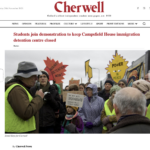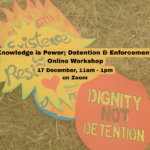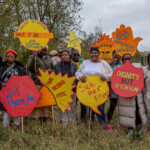
On 6 July 2022, remaining parts of the Nationality and Borders Act (or “NABA”) became law. It introduces grim and far-reaching changes to the UK asylum system and is likely to have a devastating impact on the lives of people fleeing persecution (this means danger specific to them in the country they are from) and seeking safety in the UK.
It is important to note that most of these changes do not apply to people who lodged their claims for asylum before 28 June 2022.
We are in the process of updating our Toolkit to incorporate the changes that NABA will bring, and we will write detailed Legal Update blogs about this in the next few months.
However, it may be some time before the effects of NABA are fully understood. This is because regulations (the formal guidelines) on how parts of NABA will work in practice have not yet been implemented. The legality of certain sections of NABA is also very much up for debate.
This means that we are likely to see a lot of case law in the coming months and years clarifying how the legislation should be interpreted. To learn more about case law, watch our ‘Understanding Case Law’ video.
The changes
For now, we have summarised some of the key changes below:
- Criminalising Asylum
- Inadmissibility and Safe Third Countries
- Group 1 and Group 2 Refugees
- Humanitarian Protection
- Priority Removal Notices (PRNs) and Abbreviated Appeals
- Priority Removal Notices and Submission of Late Evidence
- Accelerated Detained Appeals
- No Out-of-Country Appeals
- Lowering the ‘Particularly Serious Crime’ Threshold
- Changes to Human Trafficking Law
Criminalising Asylum
It is now illegal for someone who needs a visa to enter the UK to arrive in the country without one. Nationals of all refugee-producing countries must have visas to enter the UK. This means that almost everyone who enters the UK to claim asylum will now technically be breaking the law. The crime carries a maximum sentence of four years in prison.
However, it is unlikely that people seeking asylum will be prosecuted (have criminal proceedings brought against them) often because this would put a lot of pressure on the UK courts and prisons. When the Nationality and Borders Bill was being debated in parliament (before it formally became a law and an ‘Act’) it was suggested that prosecutions would target:
“…those migrants in cases where there are aggravating factors—where they caused danger to themselves or others, including rescuers; where they caused severe disruption to services such as shipping routes, or the closure of the channel tunnel; or where they are criminals who have previously been deported from the UK or persons who have been repeatedly removed as failed asylum seekers.”
Even if prosecutions are rare in practice, the existence of this section of NABA is very disturbing.
Inadmissibility and Safe Third Countries
NABA gives the Home Office the power to treat asylum claims made by people who have a “connection” (this means link) to a safe third country as ‘inadmissible’. A safe third country is any safe country that the person may have travelled through on their way to the UK. This means that their asylum claim will be invalid and the Home Office will not have a duty to process it. Rules on inadmissibility have been in force since January 2021 but are now codified (recognised as formal law) in NABA.
Someone with a “connection” to a safe country is defined in NABA as a person who:
- Has been recognised as a refugee in the safe third State, and remains able to access protection in accordance with the Refugee Convention in that State.
- Has been granted some other protection in a safe third State as a result of which the claimant would not be sent from the safe third State to another State in breach of the Refugee Convention or the Article 3 of the ECHR and remains able to access that protection in that State.
- Has made a relevant claim to the safe third State and the claim has either not yet been determined, or has been refused.
- Was previously present in, and eligible to make a relevant claim to the safe third State, it would have been reasonable to expect them to make such a claim, and they failed to do so.
- In the claimant’s particular circumstances, it would have been reasonable to expect them to have made a relevant claim to the safe third State (instead of making a claim in the UK).
When it is decided that a person’s asylum claim is ‘inadmissible’, the Home Office can attempt to remove them to a ‘safe’ country. To be clear, this does not necessarily mean that the person will be removed to the safe third country that they passed through – it might be another country that the Home Office has decided is ‘safe’. For example, in April 2022, the Rwandan government agreed to host asylum seekers transferred from the UK. Whether this plan will succeed in practice remains to be seen. At the time of writing the UK government has failed to send anybody to Rwanda.
If the Home Office is not able to remove someone to a ‘safe’ country, that person will eventually be allowed to claim for asylum in the UK, but the inadmissibility rules increase the immense delays already faced by people claiming asylum. This means that it could take a long time to receive an asylum decision.
Group 1 and Group 2 Refugees
NABA creates an asylum system with two levels. People who have come to the UK directly (without passing through a safe country) and have claimed asylum without delay will fall into ‘Group 1’ which will be similar to the pre-NABA asylum system route. You can read more about claiming asylum in the UK – which will now be similar to the Group 1 experience – here.
Everyone else will fall into ‘Group 2’ and, if their claims succeed, will be granted a lesser type of leave. Instead of refugee status, Group 2 refugees will be granted something called ‘temporary refugee permission’. This status gives only 30 months of leave to remain in the UK, with an option to settle (this means live permanently in the UK) after 10 years of lawful residence. People with temporary refugee permission will also face more challenges when applying for family members to join them in the UK via the family reunion route. To learn more about the family reunion route for people granted refugee status under Group 1, read this useful guide published by Free Movement.
After being informed that they are in Group 2, people claiming asylum will be given 10 working days to explain why their claim should be moved to Group 1. The decision to put someone in Group 2, however, does not come with a right of appeal. Any unlawful decisions will need to be judicially reviewed.
Humanitarian Protection
People granted Humanitarian Protection will now only be granted 30 months’ leave to remain. They will not be eligible to apply for indefinite leave to remain until they have lived lawfully in the UK for 10 years. Before NABA, it used to be that people with Humanitarian Protection were granted leave to remain for 5 years, and enjoyed almost all of the same rights as those with Refugee Status.
Priority Removal Notices and Abbreviated Appeals
The Home Office now has the power to give a Priority Removal Notice (or “PRN”) to anybody living in the UK without immigration status. The PRN will ask that the person reply to the Home Office with any new reasons for wishing to stay in the UK along with evidence to prove this.
The PRN will include a response deadline, which is a date by when the reply needs to be sent. If that deadline is missed, the person may not be allowed access to the First-tier Tribunal when appealing the refusal of a protection or human rights claim. Instead, the hearing could be sent straight to the Upper Tribunal (the court above the First-tier Tribunal). If the case is refused by the Upper Tribunal, there will be no option to appeal to the Court of Appeal (the court above the Upper Tribunal). In other words, their appeal will be abbreviated (this means shortened).
In these cases, the Upper Tribunal will be taking on what is usually the role of the First-tier Tribunal in most cases. These will not be ‘error of law’ hearings because they will be the first and probably only time that the Immigration and Asylum Chamber will consider the evidence.
This is a disturbing development because it means that there will be no meaningful process for checking legal errors made by the Immigration and Asylum Tribunal.
PRNs will not be issued to everyone who is liable for removal or deportation (although the Home Office does have the power to do this), instead, they will most likely be used for people who have made asylum or human rights claims before.
Priority Removal Notices and Submission of Late Evidence
People who do not send in evidence before the PRN deadline will be negatively affected in more ways than one. Their appeals can be abbreviated, and any evidence they submit after the deadline could be given very little weight. This means that the evidence will be seen as less important. This will be very challenging for anyone who is trying to show that they should be allowed to stay in the UK.
According to section 26(2) of NABA:
“Unless there are good reasons why the evidence was provided late, the deciding authority must, in considering it, have regard to the principle that minimal weight should be given to the evidence.”
Accelerated Detained Appeals
NABA introduces an Accelerated Detained Appeals scheme. It looks and sounds a lot like the Detained Fast Track scheme which was found to be unlawful by the High Court in 2015.
The scheme will apply to people in detention whose appeals “would likely be disposed of expeditiously”. Expeditiously means quickly. People within the accelerated scheme will have only 5 days to appeal the refusal of their claim, and the First-tier Tribunal will have to make a decision within 25 working days. Working days are weekdays, and do not include weekends or public holidays like bank holidays.
We will know more about the scheme as time goes on.
No Out-of-Country Appeals
Since the passing of the Nationality, Immigration and Asylum Act in 2002, individuals whose protection or human rights claims had been certified (this means labelled) as “clearly unfounded” could only appeal that decision from outside the UK.
NABA removes this out-of-country right of appeal. People whose claims have been certified will have no right of appeal inside or outside the UK.
Lowering the ‘Particularly Serious Crime’ Threshold
Article 33(2) of the Refugee Convention allows states hosting refugees to remove a refugee “who, having been convicted by a final judgement of a particularly serious crime, constitutes a danger to the community”.
Until NABA, the phrase “particularly serious crime” meant a crime for which a prison sentence of at least 2 years was imposed. NABA lowers the sentence from 2 years to 1 year.
Changes to Human Trafficking Law
NABA 2022 has also introduced big changes to UK human trafficking law including:
- The introduction of a new system for submitting evidence called “slavery or trafficking information notices”.
- Penalties for the late submission of evidence.
- Disqualifying individuals who are a “threat to public order” or who have made a claim in “bad faith” from protection and support.
To learn more about the changes to modern slavery and human trafficking law, read the briefing drafted by the Anti-Trafficking and Labour Exploitation Unit (ATLEU).
Conclusion
These changes brought on by NABA will soon be explained in our Toolkit in more detail.
It is important to remember that most of these changes do not apply to people who claimed asylum before 28 June 2022.
There are many parts of NABA that are worrying, and it is going to take some time for people going through the system, their communities, and campaign groups to understand it all. But NABA is not the first of its kind and it won’t be the last.
Migrants, refugees and people seeking asylum, together with campaigners have, time and time again, successfully challenged the government’s attempts to erode the rights of migrants – nothing is set in stone and there is everything to fight for!
To learn more about campaign groups fighting anti-refugee laws, click here.
If you found this blog post useful, why not sign up to receive our Legal Updates newsletter?
To help us to continue educating about these legal changes, consider donating to support the work of Right to Remain.















how could would you mind help me with applying for a accomodation,please?i was not able to apply any bank card nor accomodations ,i felt depressed by applying for refugee status ARC?
Hello Zhou, I am so sorry to hear of the distress you are facing. At Right to Remain, we are a charity that provides legal information but we are not lawyers so we cannot assist you in making any applications.
I suggest that you read our very detailed page about ‘Asylum Support’, the different types of support available, and how to apply for it here: https://righttoremain.org.uk/toolkit/asylum-support/
You can translate the page into the language of your choice by using the ‘Google translate’ tab at the very top of the page.
Best of luck to you.